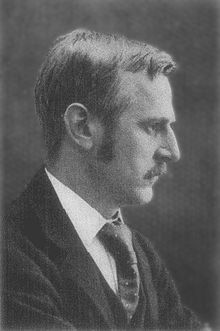Graham Wallas


Graham Wallas (* 31. Mai 1858 in Monkwearmouth; † 9. oder 10. August 1932 in Portloe, Cornwall) war ein britischer Sozialist, Sozialpsychologe, Politologe, Erziehungswissenschaftler, ein Führer der Fabian Society und Mitbegründer der London School of Economics.
Leben
Wallas besuchte die Shrewsbury School und das Corpus Christi College (Oxford). Er lehrte an der Highgate School bis 1885, als er zurücktrat, um nicht an der Eucharistie teilzunehmen. Er trat in die Fabian Society im April 1886 ein, seinen Freunden Sidney Webb und George Bernard Shaw folgend, und gehörte zum Vorstand. 1904 trat er im politischen Streit wieder aus.
1897 heiratete er die sozialistische Autorin Ada Radford. Wallas arbeitete im Bereich der Londoner Schulerziehung an Reformen.[1] 1890 wurde er Hochschullektor und 1895 dies an der von ihm mitgegründeten London School of Economics. 1914 wurde er dort der erste Professor für Politologie.[2] Er publizierte 1898 eine Biografie von Francis Place. Durch Aufenthalte in den USA konnte er dort einigen Einfluss ausüben: 1896–1897, 1910 (Harvard), wo er Walter Lippmann kennenlernte, 1914 (Lowell Lecturer in Boston), 1919 (Yale), 1928 (Williamstown). 1923 trat er an der LSE in den Ruhestand.
Ideen
Im Buch Human Nature in Politics (1908) entwickelte er den Gedanken, dass die Erziehung und Bildung für die politischen Standpunkte der breiten Massen keine Bedeutung hätten. Politische Einstellungen beruhen für ihn auf Emotionen und medialen Suggestionen. Bei öffentlichen Diskussionen werde nur wahrgenommen, was der eigenen Meinung entspreche. Lippmann führte dies 1922 (Public Opinion) weiter aus.
Im Werk Great Society (1914) zeigte Wallas, eine sozialpsychologische Analyse könne die Probleme erklären, die die Industrielle Revolution in der modernen Gesellschaft bewirke. Er kontrastierte die Rolle von nature (Natur) und nurture (Pflege, Umwelt) und plädierte für deren umfassenden Ausbau. Den Titel des Buches nahm Lippmann 1937 für sein Werk über den Liberalismus auf.
In The Art of Thought (1926) bezog er sich auf Hermann von Helmholtz und Henri Poincaré, um ein erstes Modell zu den Phasen des kreativen Prozesses mit vier Stadien vorzustellen: Vorbereitung (oder Saturierung), Inkubation, Erleuchtung (heureka-Erlebnis) und Überprüfung. Mihály Csíkszentmihályi führte das sehr bekannt gewordene Konzept weiter.
Schriften
- Property Under Socialism in: Fabian Essays in Socialism (1889).
- The Life of Francis Place, 1771–1854 (1898).
- Human Nature in Politics (1908).
- The Great Society. A Psychological Analysis. (1914). ISBN 978-0217446679
- Our Social Heritage (1921).
- The Art of Thought (1926). ISBN 978-1910146057
Literatur
- Martin Wiener (1971). Between two worlds : The political thought of Graham Wallas, Oxford: Clarendon Press
Weblinks
Einzelbelege
- ↑ Graham Wallas | British political scientist. Abgerufen am 26. Juni 2020 (englisch).
- ↑ Graham Wallas - New World Encyclopedia. Abgerufen am 26. Juni 2020.
| Personendaten | |
|---|---|
| NAME | Wallas, Graham |
| KURZBESCHREIBUNG | britischer Sozialwissenschaftler und Politiker |
| GEBURTSDATUM | 31. Mai 1858 |
| GEBURTSORT | Monkwearmouth |
| STERBEDATUM | 9. August 1932 oder 10. August 1932 |
| STERBEORT | Portloe |
Auf dieser Seite verwendete Medien
Autor/Urheber: Library of the London School of Economics and Political Science, Lizenz: No restrictions
Professor of Political Science 1914-1923
Extracts from ‘Portraits from the Past: Graham Wallas: 1858-1932,’ by W.A. Robson from LSE Magazine, May 1971, No41, p.5
‘The son of an Anglican clergyman, he went to Shrewsbury and then to Corpus Christi College, Oxford, where he read classics. His first post was as a schoolmaster at Highgate School but he left after a few years on a question of religious conformity. He then became an extension lecturer in London University in 1890. He joined the Fabian Society in its early days and wrote one of the original Fabian Essays. As a friend and colleague of the Webbs and Bernard Shaw he played a leading part in the creation and development of LSE from the day of its conception in August 1894, at the farm near Godalming where the four were staying, until the end of his active life. He was a lecturer at the School from 1895 and later became its first Professor of Political Science…Wallas was much greater as teacher than as a writer. As H.G Wells remarked in his Autobiography, ‘the London School of Economics will testify how much the personal Graham Wallas outdid the published Graham Wallas…there is scarcely any considerable figure among the younger generation of publicists who does not owe something to his slow, fussy, mannered, penetrating and inspiring counsels.’ Of his own debt Wells wrote ‘I cannot measure justly the influence of the disinterested life he led on my own. It was I think very considerable.’ Many of us who were his students and friends feel a similar debt. No small part of Wallas’ influence was due to his lovable personality and the spirit of benevolence and altruism which shone through him at all times.’
Excerpt from reminiscences of former staff. 'LSE Material on the history of the School' LSE Archives ref R(S.R)1101, p.119:
Florence Mare on Graham Wallas,
'Of all the lecturers I think the most beloved was that great man Graham Wallas. He was a born teacher: his simplicity of illustration, his enthusiasm for his subject, his profound analysis of causes made a deep impression on all who attended his lectures in political science. Essays set by him had to be forthcoming no matter which others got left undone! On the completion of a course of lectures which he gave many years afterwards at B'ham Univ I remember him standing stock still, dumfounded at the thunderous burst of applause that came from the audience. Then he softly murmured 'thank you.'
IMAGELIBRARY/272
Persistent URL: archives.lse.ac.uk/dserve.exe?dsqServer=lib-4.lse.ac.uk&a...
